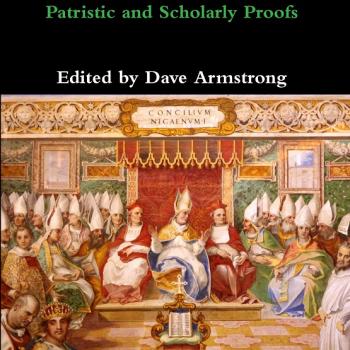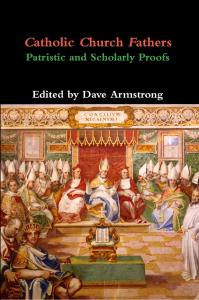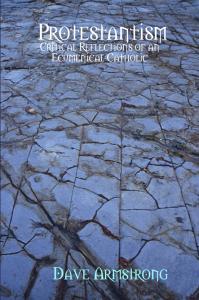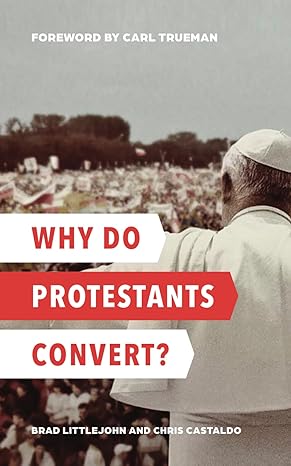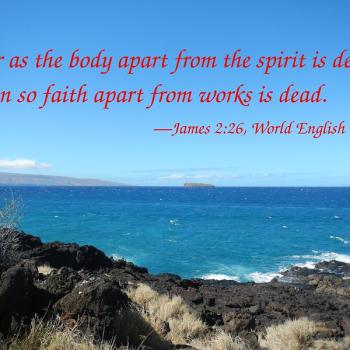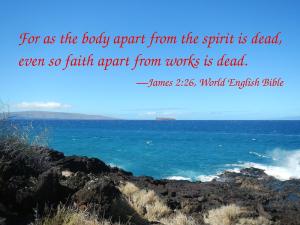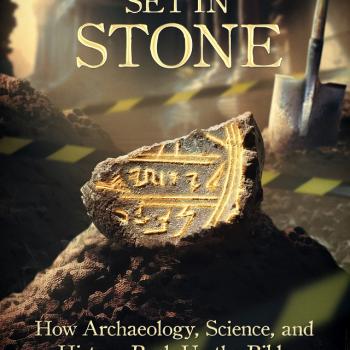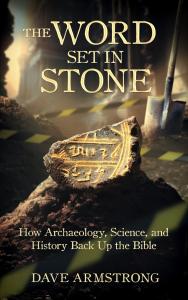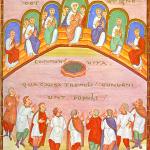+ Concupiscence: St. Ambrose’s and St. Augustine’s Views
Rev. Dr. Jordan B. Cooper is a Lutheran pastor, adjunct professor of Systematic Theology, Executive Director of the popular Just & Sinner YouTube channel, and the President of the American Lutheran Theological Seminary (which holds to a doctrinally traditional Lutheranism, similar to the Lutheran Church – Missouri Synod). He has authored several books, as well as theological articles in a variety of publications. All my Bible citations are from RSV, unless otherwise indicated. Jordan’s words will be in blue.
This is my 5th reply to Jordan (many more to come, because I want to interact with the best, most informed Protestant opponents). All of these respectful critiques can be found in the “Replies to Lutheran Theologian / Apologist Jordan Cooper” section on the top of my Lutheranism web page.
*****
See Part One: Faith Alone in the Early Church Fathers? (vs. Jordan Cooper) — Includes Clement of Rome (d. c. 101) & Polycarp (d. 155) vs. Faith Alone [2-28-24]
***
This is a response to Jordan’s YouTube video, “Sola Fide in the Church Fathers Part 2: Ambrose (A Classic J&S Episode)” (2-24-22). Originally (I assume) this talk was published around 3-27-19.
0:35 On the previous program I discussed sola fide in the Church fathers, basically trying to interact with the common Roman Catholic argument that sola fide is a theological novum, so the notion of justification by faith alone . . . it’s a common Roman Catholic claim that . . . it shows up later in history, and you can’t find it in the Church fathers at all. [They say that] Luther basically invents this brand new idea. This especially shows up in a lot of popular Roman Catholic polemics online, and I’ve made the claim that that’s simply not the case and that we can find instances of sola fide or various Protestant aspects of justification in the Church fathers.
As I noted last time, this claim about the absence profound of sola fide is by no means confined to “Roman Catholic polemicists.” In my previous critique I cited three well-known Protestant scholars, who all expressed basically the same thing (and they can’t be accused of Catholic bias). Alister McGrath, author of The Nature of Christian Doctrine: Its Origins, Development, and Function (2024), stated that sola fide, as newly formulated — not by Luther but by his successor, Philip Melanchthon –, was “a complete break with the teaching of the church up to that point.”
That’s his informed scholarly opinion. He knows far more than I ever will about the subject. I’m simply repeating and agreeing with his judgment, based on his status and everything I’ve seen myself along these lines, over 33 years of Catholic apologetics research. He agrees with the break, as a good Protestant, but he doesn’t try to deny that it was, historically speaking, a break. He was the one, incidentally, who — three times — called sola fide a “theological novum” (in the 2nd edition of Iustitia Dei in 1998, pp. 180, 184, 187) I also cited Philip Schaff, author of the multi-volume History of the Christian Church and editor of the famous 38-volume set of the Church fathers (that I regularly cite from, since it is online now).
I almost bought that set in hardcover so many times over the last 25 years! Schaff stated that “If any one expects to find in this period [100-325], or in any of the church fathers, Augustin himself not excepted, the Protestant doctrine of justification by faith alone, . . . he will be greatly disappointed.” Jordan Cooper disagrees with these three scholars (Norman Geisler was the third) as to the history. I don’t think he proved at all that Clement of Rome or Polycarp believed in sola fide, in his previous attempt (see my reply), and we will now examine his argument that St. Ambrose was supposedly a good “proto-Protestant” in soteriological matters too.
3:21 It’s not good to just take isolated statements of fathers apart from their whole body of work.
I heartily agree! I just as strongly disagree that supposedly only Catholic and Orthodox ever do this. Protestant polemicists do quite a bit too. I know; I’ve repeatedly interacted online with these sorts of effort since 1997, and one can read all those exchanges on my extensive Fathers of the Church web page.
7:56 The first of those fathers that I want to look at is St. Ambrose, and I just want to go through and examine some of the quotes that you find in his writings.
I’m delighted to join him on this journey. Jordan agrees with me that we need to look at an author’s entire corpus, or at least as many books as we can access (I have limited resources to buy rare books with; so thank the Lord for the thousands of online books!).
8:26 Ambrose is actually cited in the Augsburg Confession as an early testament to this notion of justification by faith alone . . . I think that Ambrose in the vast scope of his writings clearly at least in some places teaches something very much like that.
Interesting.
9:25 In his treatise on Jacob and the Happy Life he says “don’t you know that the guilt of Adam and Eve sold you into servitude? Don’t you know that Christ did not buy you but bought you back?” Those kinds of statements are all over the place, that . . . Adam’s guilt actually brings us into slavery and brings us death. There is an emphasis on guilt especially coming from Adam . . .
For a fuller quotation of this work, On Jacob and the Happy Life, see Jordan’s article, “St. Ambrose On Law And Gospel” (Just and Sinner, 6-3-14).
The Council of Trent stated in its Decree Concerning Original Sin in its Session 5 on June 17, 1546, four months after Luther’s death, in section 2, that “this sin of Adam” was “taken away” by “the merit of the one mediator, our Lord Jesus Christ, who hath reconciled us to God in his own blood, made unto us justice, sanctification, and redemption” and that this was “applied, both to adults and to infants, by the sacrament of baptism.”
So why does Jordan bring up this particular thing in the context of discussing sola fide? It’s because Lutherans and the early Protestants generally, erroneously believed that concupiscence (desire to or tendency towards sin) was itself a sin and a remnant of the guilt that we inherited from Adam. Trent condemned this opinion in section 5 of the same decree:
If any one denies, that, by the grace of our Lord Jesus Christ, which is conferred in baptism, the guilt of original sin is remitted; or even asserts that the whole of that which has the true and proper nature of sin is not taken away; but says that it is only raised, or not imputed; let him be anathema. For, in those who are born again, there is nothing that God hates; because, There is no condemnation to those who are truly buried together with Christ by baptism into death; who walk not according to the flesh, but, putting off the old man, and putting on the new who is created according to God, are made innocent, immaculate, pure, harmless, and beloved of God, heirs indeed of God, but joint heirs with Christ; so that there is nothing whatever to retard their entrance into heaven. . . .
Jordan provides an extended argument from a treatise by Ambrose that I can’t access, in which the Church father asserts that concupiscence is itself sin. Jordan then insinuates that Ambrose held to one tenet of the many involved in the “Reformation” belief in sola fide (more to do with the nature and results of original sin than with justification per se). If he is correct in his assessment (but maybe he isn’t; see more on this below), then Catholics would say that Ambrose got this teaching wrong. The Catholic Church followed St. Augustine in this respect:
Chapter 25 [XXIII.]— Concupiscence in the Regenerate Without Consent is Not Sin; In What Sense Concupiscence is Called Sin.
Now this concupiscence, this law of sin which dwells in our members, to which the law of righteousness forbids allegiance, saying in the words of the apostle,
Let not sin, therefore, reign in your mortal body, that you should obey it in the lusts thereof; neither yield your members as instruments of unrighteousness unto sin:Romans 6:12-13 — this concupiscence, I say, which is cleansed only by the sacrament of regeneration, does undoubtedly, by means of natural birth, pass on the bond of sin to a man’s posterity, unless they are themselves loosed from it by regeneration. In the case, however, of the regenerate, concupiscence is not itself sin any longer, whenever they do not consent to it for illicit works, and when the members are not applied by the presiding mind to perpetrate such deeds. So that, if what is enjoined in one passage,You shall not covet,is not kept, that at any rate is observed which is commanded in another place,You shall not go after your concupiscences.[Sirach 18:30] Inasmuch, however, as by a certain manner of speech it is called sin, since it arose from sin, and, when it has the upper hand, produces sin, the guilt of it prevails in the natural man; but this guilt, by Christ’s grace through the remission of all sins, is not suffered to prevail in the regenerate man, if he does not yield obedience to it whenever it urges him to the commission of evil. As arising from sin, it is, I say, called sin, although in the regenerate it is not actually sin; and it has this designation applied to it, just as speech which the tongue produces is itself calledtongue;and just as the wordhandis used in the sense of writing, which the hand produces. In the same way concupiscence is called sin, as producing sin when it conquers the will: so to cold and frost the epithetsluggishis given; not as arising from, but as productive of, sluggishness; benumbing us, in fact. (On Marriage and Concupiscence, Book I, ch. 25)
He states again in chapter 27: “carnal concupiscence . . . is no longer accounted sin in the regenerate . . .” And again in chapter 28: “Carnal concupiscence is remitted, indeed, in baptism; not so that it is put out of existence, but so that it is not to be imputed for sin.” And in chapter 29: “In the case, then, of those persons who are born again in Christ, when they receive an entire remission of all their sins, it is of course necessary that the guilt also of the still indwelling concupiscence should be remitted, in order that (as I said) it should not be imputed to them for sin.” Then he provides a thoroughly Catholic interpretation of Romans 7 and 8:
Chapter 36.— Even Now While We Still Have Concupiscence We May Be Safe in Christ.
But the apostle pursues the subject, and says,
So then with the mind I myself serve the law of God, but with the flesh the law of sin;[Romans 7:25] which must be thus understood:With my mind I serve the law of God,by refusing my consent to the law of sin;with my flesh, however,I servethe law of sin,by having the desires of sin, from which I am not yet entirely freed, although I yield them no assent. Then let us observe carefully what he has said after all the above:There is therefore now no condemnation to them which are in Christ Jesus.[Romans 8:1] Even now, says he, when the law in my members keeps up its warfare against the law of my mind, and retains in captivity somewhat in the body of this death, there is no condemnation to them which are in Christ Jesus. And listen why:For the law of the spirit of life in Christ Jesus,says he,has made me free from the law of sin and death.[Romans 8:2] How made me free, except by abolishing its sentence of guilt by the remission of all my sins; so that, though it still remains, only daily lessening more and more, it is nevertheless not imputed to me as sin?
If Jordan’s take of St. Ambrose’s view is correct, Lutheranism followed his rather than St. Augustine’s view with regard to the nature of concupiscence). In any event, this is not all that is involved in the discussion of “faith alone.” It’s only indirectly or partially related, so that I don’t think it’s accurate to say that “St. Ambrose held to justification by faith alone” on the basis of this single (suggested) consideration. One’s opinion on the nature of concupiscence simply isn’t the equivalent of “justification by faith alone.”
But did Ambrose really hold this view (never forsaking it)? Anglican patristic scholar J. N. D. Kelly suggests that he either changed his mind or contradicted himself, as to the presence of guilt from original sin after baptism. Kelly writes:
The second of Ambrose’s texts cited above [On the Death of Satyrus, Book II, 6] suggests that the race is infected with Adam’s actual guilt. His more general doctrine, however, is that, while the corrupting force of sin is transmitted, the guilt attaches to Adam himself, not to us. . . . But our personal (propria) sins are to be contrasted with those we inherit (haereditaria); baptism removes the former, but the rite of washing of feet the latter. (Early Christian Doctrines, San Francisco: Harper, revised edition of 1978, 354-355)
The (perhaps surprising) foot-washing element was expressed by Ambrose in his treatise, On the Mysteries (ch. 6, 32):
Peter was clean, but he must wash his feet, for he had sin by succession from the first man, when the serpent overthrew him and persuaded him to sin. His feet were therefore washed, that hereditary sins might be done away, for our own sins are remitted through baptism.
Kelly continues:
This hereditary sin, he argues elsewhere [Enarr. in ps. 48. 9], is a wound which makes us stumble, but need cause us no anxiety at the day of judgment; we shall only be punished then for our personal sins. . . . It is clear that he envisages the inherited corruption as a congenital propensity to sin (the phrase he uses is lubricum delinquendi) rather than as a positive guilt. (Ibid., 355)
And this is identical to Catholic teaching on concupiscence. In Jordan’s citation of Ambrose’s book, On Jacob and the Happy Life, in his related article, he cites him as stating, “I became aware that concupiscence was sin,” in the midst of an apparent extended citation of St. Paul in Romans 7. He cites it again at 15:35 in his video. As far as I can tell, Ambrose might have been citing or reflecting Romans 7:8, which in KJV reads, “But sin, taking occasion by the commandment, wrought in me all manner of concupiscence. For without the law sin was dead.” Jordan said:
16:05 He says even the desire for sin is itself sin, and this is his interpretation of a passage like Romans 7, where Paul speaks about his understanding his knowledge of sin and what sin is. . . . at the time of the Reformation, Martin Luther claimed concupiscence was sin. The Roman church said no, the desire for sin is not itself sin; it’s only the actual act that flows out of that, that is willing, that is sin, and Martin Luther had a much broader understanding of what constitutes sin and the sin nature than Rome did. . . . there are a lot of hints here that Ambrose would take the position that Luther does, that even the desire for sin itself is sin.
The word concupiscence appears three times in the NT in the KJV. It doesn’t appear at all in the RSV New Testament, which translates Romans 7:8 as “But sin, finding opportunity in the commandment, wrought in me all kinds of covetousness. Apart from the law sin lies dead.” The Greek word is epithumia (Strong’s word #1939: see its use and translation in English Bibles). But Jordan himself also wrote about St. Ambrose: “a lot of his interpretations are a little strange and he isn’t always consistent or on track with what the [biblical] text actually says; he often goes on tangents about whatever he really feels like teaching.” (13:02). Maybe so in the above instance . . .
If St. Ambrose denied what is the Catholic teaching on concupiscence, expressed by St. Augustine and the Council of Trent, he only did so in some but not all of his writing, and/or contradicted himself, or else thought twice about his original position and (from a Catholic perspective) corrected it.
On a web page from the Lutheran site, Fourth Century Christianity, that provides the “approximate chronological order” of Ambrose’s writings, we find that On Jacob and the Happy Life, was written in 386-388. On the Death of Satyrus dates from 379. On the Mysteries is from c. 387. Explanations of Twelve Psalms of David, cited by Kelly, where Ambrose expresses Catholic views, is the last dated work on this list; described as “Later career to death (unfinished).” So it looks like Ambrose held a more “proto-Protestant” view earlier on (379), then perhaps wavered or was unsure (386-388), and eventually settled on the Catholic view (by the time of his death in 397). The position Kelly describes is the one he held at the end of his life. This is what we can learn by examining the matter more closely.
Jordan continues on, up to the 36 minute mark, talking about this one work, On Jacob and the Happy Life, which doesn’t appear to be online, so I can’t analyze contextual elements or the entire work. Then he moves on to a “treatise on Joseph” (36:12) which is also — far as I can tell — unavailable online. And he discusses matters concerning our redemption and justification through Christ’s death on the cross, which likely are no different from what Catholics believe (though many Lutherans wrongly think that we are different), and only indirectly related, at best, to the topic of justification by faith alone.
The latter concept primarily has to do with the issue of the relation of faith and works, and whether sanctification is a fundamentally different category from justification: under which non-salvific works are categorized (in a way that the Bible never does). I waited for Jordan to get to those central disputes, as I went through his tape, but it turns out that he never did.
38:48 Saint Ambrose has a stronger view of original sin than a lot of the other church fathers do . . .
Or maybe it turned out that by the end of his life he didn’t, which was what my citation of J. N. D. Kelly was related to. It looks to me that St. Ambrose, in the final analysis, did not hold to total depravity or to the notion of a “sin nature.” So Kelly says about his fully developed view (see above): “It is clear that he envisages the inherited corruption as a congenital propensity to sin.” That’s what Catholics say: concupiscence.
Then he goes onto a discussion of Eastern Orthodoxy. He never even discusses the central question of faith and works, in a video entitled, “Sola Fide in the Church Fathers Part 2: Ambrose.” I think it’s a misnomer! He talked only about original sin and concupiscence, from basically just one work, and even then, arguably proved little or nothing, even about that specific topic, in light of Kelly’s conclusions on the general matter. Jordan virtually admitted this himself:
41:32 Oh my gosh, I didn’t get through anything that I wanted to. I went through one book of Ambrose and just grabbed quotes. I know I’m going really slow through this, but maybe this is what we need to do to show that we can do more than just quote mining from various books.
What he derisively calls merely “quote mining” is in fact what is necessary to do: locate relevant quotations from a father in order to determine his overall teaching on a given theological matter. This is precisely what we do in systematic theology, pertaining to Bible quotes. We collect relevant ones on a topic (say, original sin) and go from there, to determine what the Bible teaches about it. The more context the better (I’m all for that). Jordan is concerned about context, as he should be. I am, too, having seen what my Protestant debate opponents have too often done with context, regarding both the Bible and the fathers. But Jordan insinuates that Catholics (especially popular so-called “polemicists” like me) have a strong tendency to collect patristic quotes that are highly selective and out-of-context, etc. Some do, no doubt, and some don’t. Like most things, it’s a mixed bag and we can only examine what each individual writer does.
41:48 I do want to say for someone who’s listening to this and is Roman Catholic, I know the immediate response, especially for someone who has the volume is that, well, Ambrose also . . . says some things that may not appear as Lutheran or Protestant as the statements you read and that’s true . . .
Wouldn’t it be only fair and thorough to examine those as well, rather than only the “Lutheran”-sounding ones? I have dealt with these highly selective citations in depth in this reply. Jordan needs to do the same with the more “Catholic” statements of Ambrose. But he winds up — nothing personal! — doing largely the same thing that he claims here and in other videos, that Catholics and Orthodox do: pick out only portions from the fathers or one father that seem to support their case and ignore ones that don’t appear to do so.
St. Ambrose thinks that works indeed play a role in determining whether we are saved or not:
The deserts of each one of us are suspended in the balance, which a little weight either of good works or of degenerate conduct sways this way or that; if the evil preponderate, woe is me! if the good, pardon is at hand. For no man is free from sin; but where good preponderates, the evil flies up, is overshadowed, and covered. Wherefore in the Day of judgement our works will either succour us, or will sink us into the deep, weighed down as with a millstone. . . . Wherefore exhort the people of God to trust rather in the Lord, to abound in the riches of simplicity, wherein they may walk without snare and without hindrance. (Letter II: To Constantius, a Bishop; from The Letters of S. Ambrose, Oxford: 1881; my italics)
This entirely lines up with biblical accounts of the Day of Judgment. I’ve found fifty biblical passages, all of which make works — not antithetical to faith — extremely important as to salvation (only one mentioned faith alongside works). This is clearly contrary to justification by faith alone, in which we stand before God when being judged in the end and can or will say, “all my sins were covered by Christ’s imputed justification, so I’m saved; works have nothing to do with it!”
But Ambrose, who had a very different outlook, highlights works, works, works at the judgment. Why? It’s because it’s entirely biblical, especially regarding the Last Judgment, as I showed. Ambrose simply mirrors an overwhelming teaching of Holy Scripture. He makes the same point in an even more direct and undeniable way elsewhere (that couldn’t be more contrary to faith alone than it is):
If thou clothe the naked, thou clothest thyself with righteousness; if thou bring the stranger under thy roof, if thou support the needy, he procures for thee the friendship of the saints and eternal habitations. That is no small recompense. Thou sowest earthly things and receivest heavenly. . . . Clearly blessed is he from whose house a poor man has never gone with empty hand. Nor again is any one more blessed than he who is sensible of the needs of the poor, and the hardships of the weak and helpless. In the day of judgment he will receive salvation from the Lord, Whom he will have as his debtor for the mercy he has shown. (On the Duties of the Clergy, Book I, 11, 39; my italics)
But the sacred Scriptures say that eternal life rests on a knowledge of divine things and on the fruit of good works. The Gospel bears witness to both these statements. For the Lord Jesus spoke thus of knowledge:
This is eternal life, to know You, the only true God, and Jesus Christ Whom You have sent.[John 17:3] About works He gives this answer:Every one that has forsaken house, or brethren, or sisters, or father, or mother, or wife, or children, or lands, for My Name’s sake, shall receive an hundred-fold, and shall inherit everlasting life.[Matthew 19:29]He has further also in the same psalm stated of good works, that they gain for an upright man the gift of eternal life. He speaks thus:
Blessed is the man that shows pity and lends, he will guide his affairs with discretion, surely he shall not be moved for ever, the righteous shall be in everlasting remembrance.And further:He has dispersed, he has given to the poor, his justice endures forever.(Ibid., Book II, 2, 5 and 6; my italics; Psalm 37:28 states: “he will not forsake his saints. The righteous shall be preserved for ever”: RSV)
In the faith alone view, such works are considered, in the end, optional, as to salvation. For Ambrose (and for Jesus, too, as we see above), they literally help bring about salvation (a direct relation). This is the Catholic view whereby sanctification is not separated from justification; nor works from faith. It’s not works-salvation (Pelagianism). It’s a centrality of works that necessarily flow from grace-produced and grace-enabled faith and justification, per the Bible (again, see my fifty proofs above). Ambrose refuses to separate works from faith, or vice versa:
Faith, then, has [the promise of] eternal life, for it is a good foundation. Good works, too, have the same, for an upright man is tested by his words and acts. For if a man is always busy talking and yet is slow to act, he shows by his acts how worthless his knowledge is: besides it is much worse to know what one ought to do, and yet not to do what one has learned should be done. On the other hand, to be active in good works and unfaithful at heart is as idle as though one wanted to raise a beautiful and lofty dome upon a bad foundation. The higher one builds, the greater is the fall; for without the protection of faith good works cannot stand. A treacherous anchorage in a harbour perforates a ship, and a sandy bottom quickly gives way and cannot bear the weight of the building placed upon it. There then will be found the fullness of reward, where the virtues are perfect, and where there is a reasonable agreement between words and acts. (Ibid., Book II, 2, 7; my italics)
That is not teaching faith alone and the Protestant view, folks. He reiterates the point again (repetition being a great teacher): “the blessedness of eternal life is the reward for good works” (Book II, 3, 9). Likewise, Ambrose states:
But what does it profit me, if God Himself knows all my hairs? That rather abounds and profits me, if the watchful witness of good works reward me with the gift of eternal life. (On the Holy Spirit, Book II, Introduction, 16)
. . . the resurrection brings with it either the reward of good works, or the punishment of wicked ones . . . (On the Death of Satyrus, Book II, 52)
You did not dedicate yourself to the Lord on purpose to make your family rich, but that you might win eternal life by the fruit of good works, and atone for your sins by showing mercy. . . . They attempt to take away the fruits of your life, and think they are acting rightly. And one accuses you because you have not made him rich, when all the time he wished to cheat you of the reward of eternal life. (On the Duties of the Clergy, Book I, ch. 30, 150)
Therefore, St. Ambrose did not believe in justification by faith alone. Protestant historian Philip Schaff describes the “Reformation” doctrine:
[I]t is the righteousness which God freely gives in Christ to those who believe in him. Righteousness is not to be acquired by man through his own exertions and merits; it is complete and perfect in Christ, and all the sinner has to do is to accept it from Him as a free gift. Justification is that judicial act of God whereby he acquits the sinner of guilt and clothes him with the righteousness of Christ on the sole condition of personal faith which apprehends and appropriates Christ and shows its life and power by good works, as a good tree bringing forth good fruits.
The Pauline doctrine of justification as set forth in the Epistles to the Romans and Galatians, had never before been clearly and fully understood, not even by Augustin and Bernard, who confound justification with sanctification. Herein lies the difference between the Catholic and the Protestant conception. In the Catholic system justification (dikaivwsi) is a gradual process conditioned by faith and good works; in the Protestant system it is a single act of God, followed by sanctification. It is based upon the merits of Christ, conditioned by faith, and manifested by good works. (History of the Christian Church, vol. 7, § 23. “The Victory of Justifying Faith”)
Ambrose clearly doesn’t believe the above, which is proven in how he repeatedly states that works play an important role in eschatological salvation (at the last judgment). To sum up, Tim A. Troutman observed in his article, “St. Ambrose on Sola Fide” (Called to Communion, 9-16-19):
St. Ambrose speaks at length about the necessary and primary role of faith in salvation. This should not be surprising since almost all of the Church fathers did the same thing and so do the Scriptures. But the doctrine of sola fide, as condemned by the Catholic Church, is not that faith is primary in salvation but that faith is the only contributing cause of salvation (to the arbitrary exclusion of other causes). I say arbitrary because they who hold it affirm its exclusion of works of charity, . . .
Troutman cited the following (very unProtestant) passage from Ambrose:
But the apostles, having this baptism according to the direction of Christ, taught repentance, promised forgiveness, and remitted guilt, as David taught when he said:
Blessed are they whose transgressions are forgiven, and whose sins are covered. Blessed is the man to whom the Lord has not imputed sin.He calls each blessed, both him whose sins are remitted by the font, and him whose sin is covered by good works. For he who repents ought not only to wash away his sin by his tears, but also to cover and hide his former transgressions by amended deeds, that sin may not be imputed to him. (Concerning Repentance, Book II, 5, 35)
Educated Protestants could and would never frame the issue in the way that Ambrose does in all these excerpts that I have produced. Conclusion?: his views are harmonious with Catholic soteriology and not the Protestant soteriology of justification by faith alone.
***
*
Practical Matters: Perhaps some of my 4,500+ free online articles (the most comprehensive “one-stop” Catholic apologetics site) or fifty-five books have helped you (by God’s grace) to decide to become Catholic or to return to the Church, or better understand some doctrines and why we believe them.
Or you may believe my work is worthy to support for the purpose of apologetics and evangelism in general. If so, please seriously consider a much-needed financial contribution. I’m always in need of more funds: especially monthly support. “The laborer is worthy of his wages” (1 Tim 5:18, NKJV). 1 December 2021 was my 20th anniversary as a full-time Catholic apologist, and February 2022 marked the 25th anniversary of my blog.
PayPal donations are the easiest: just send to my email address: apologistdave@gmail.com. Here’s also a second page to get to PayPal. You’ll see the term “Catholic Used Book Service”, which is my old side-business. To learn about the different methods of contributing (including Zelle), see my page: About Catholic Apologist Dave Armstrong / Donation Information. Thanks a million from the bottom of my heart!
*
***
Photo credit: St Ambrose, by Matthias Stom (fl. 1615-1649) [public domain / Wikimedia Commons]
Summary: Lutheran apologist Jordan Cooper claimed that St. Ambrose taught “faith alone” (citing one work). I offer a counter-explanation & many other counter-evidences.




